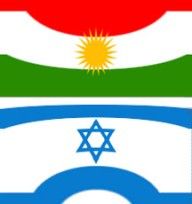The Israeli-Kurdish Relations
By Sergey Minasian
"21-st Century", No 1, April, 2007
(selected quotes)
Quotes from the article "The Israeli-Kurdish Relations", an article by Sergey Minasian, published in "21-st Century", No1, April, 2007.To show that its contents is accepted by Zionist circles, this article was for instance hailed in IKN - the Israel Kurdistan Network - as an "interesting document", a "great work about the Israeli Kurdish Relations" (http://israelkurdistannetwork.blogspot.com/2008/10/great-work-about-israeli-kurdish.html).
In his introduction, mr Minasian, writes:
"This article is dedicated to the Israeli-Kurdish relations within the framework of political processes in the Near and Middle East. The history and general dynamics of these relations is shown with a special emphasis on the analysis of the latter after the establishment of the State of Israel and the attempted utilization of the Kurdish factor by Israel in its regional strategy against the Arab surroundings."So what writes mr. Minasian that so enthrills the Israeli-Kurdo allies?
Here some sample quotes from his work on the historical military connections between the Jewish state and its agents and the Kurdish groups, mainly in Iraq:
The initial success of the Iraqi Kurds in the struggle against the Baghdad regime attracted the attention of the Israeli special services which regarded themas efficient allies in their struggle against Syria and Iraq, Israel’s most consistent adversaries in the region. That is why by the end of 1950s, with respect to the Kurdish minorities in Arab states, Israel pursued the policy later referred to as the "peripheral strategy."[...]
Back in the late 1930s, the initiative of establishing contacts with the Kurds belonged to an officer of the Zionist secret service Rubin Shilia, one of the lead-ing ideologists of the "peripheral strategy." Under the disguise of a Hebrew school student in Baghdad he organized a network of agents and established secret contacts in the mountainous Kurdish-populated regions of Iraq. These contacts proved to be very useful during the resettlement of the Iraqi Jews to Palestine via Northern Iraq, Turkey and Iran. By the end of 1950s and in the early 1960s Israel became the principal source of weapons supplies and training for the Kurds in their struggle against the government. By various estimates, thousands of Mossad agents and instructors of the Israeli army resided in the Kurdish-populated regions of Iraq at the time and conducted undercover operations.
The reports on the operations of Mossad in Iraq and its support of the Kurds repeatedly appeared in the Muslim and Israeli press and other publications. According to Victor Ostrovsky, a former Mossad agent, the Israeli secret services also actively used volunteers from humanitarian organizations and their own Iraqi agents for special subversive and terrorist operations in Iraq [23].
Various arms supplies for the Iraqi Kurds actively continued in 1965-1975 [24]. The Parastin, the intelligence service of the Kurdish Democratic Party, was also established with Mossad’s support in the late 1960s. The operations conducted by the Israeli intelligence agency in Northern Iraq were of particular significance for Israel because the Iraqi Kurds were pounded not only by the Iraqi troops but also by the regular army of Syria, another Arab state ruled by the Baath party.
[...]
Thus, owing to the Israeli support of the Iraqi Kurds, sizable Syrian forces were diverted from the borders of Israel. The engagement of the Iraqi troops in the suppression of the Kurdish insurgence prevented Iraq from participating in the Yom Kippur War against Israel in 1973 since this required the withdrawal of the Iraqi army units from the home (Kurdish) front and the Iranian border.
[...]
According to a former senior Mossad official Eliezer Tsafrir, Israel had military advisers at the headquarters of Mulla Mustafa Barzani in 1963-1975, trained and supplied the Kurdish units with fire arms, field and anti-aircraft artillery. The US also participated in this campaign [29]. Israel spent tens of millions of dollars on the support of the Kurds, supplying them via Iran, which pursued its own goals in Iraq and had close ties with Israel up until 1979.
[...]
After the Islamic Revolution in Iran, the Mossad and the CIA started to operate in the opposite direction, i.e., from the Kurdish-populated areas of Iraq (especially, the Mossad) and Turkey against Iran. The published documents of the US embassy in Teheran on the Kurdish question bear witness to the active sub-versive operations of the Mossad and the CIA in the Kurdish-populated areas of Iran [31].
[...]
------------------------------------
The notes mentioned in the above quotes from Minasian´s article:
23. For details see: Ostrovsky V. "By Way of Deception: A Devastating Insider’s Portrait of the Mossad". Toronto: Staddart, 1990.
24. McDowall D. "A Modern History of the Kurds". Bridgend 1996, p.320, 331; Mordechai N. "Minorities in the Middle East". Jefferson 1991, p. 240-241.
29. Reuters, 21.02.1999.
31. (Zhigalina, O, "The documents of the US Embassy in Teheran on the Kurdish issue")
|
Races? Only one Human race United We Stand, Divided We Fall |
 |
No time to waste. Act now! Tomorrow it will be too late |
|



































